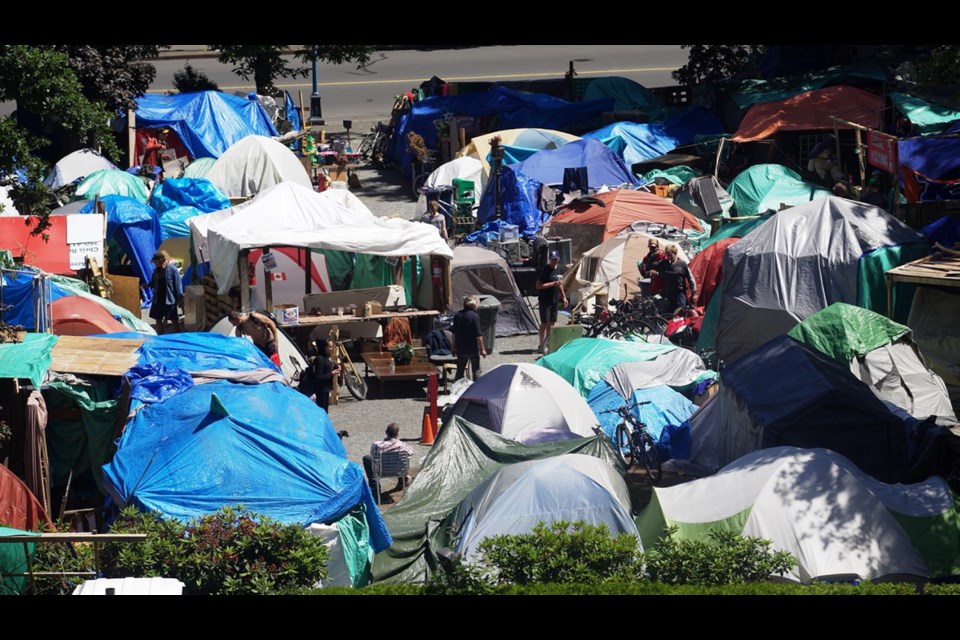 The last time B.C. made a case in court about shutting down the homeless camp, the arguments were a little underwhelming.
The last time B.C. made a case in court about shutting down the homeless camp, the arguments were a little underwhelming.
That was obvious from the Supreme Court judgment, which landed completely on the side of the campers at the courthouse tent city.
Housing Minister Rich Coleman said it’s fair comment to criticize the first failed bid for an injunction to force closure of the camp. But the government won’t be accused of underplaying its hand this time around.
It has filed 69 affidavits in support of the second attempt, with likely more to come, and Coleman went to great lengths to stress how viable the options are for people at the camp who are legitimately homeless.
“If we get the injunction, anybody that legitimately needs housing, that is homeless, will have a place to go, along with supports and meals to help them,” he said in announcing the second attempt.
But the lawyer who successfully represented the tent-city dwellers the first time said she is disappointed to see another bid made when the concerns underlying the problem haven’t been addressed.
Catherine Boies Parker said she has written to the government a half-dozen times asking to talk about alternatives to the tent city, or about an alternative location for the camp. She hasn’t heard back.
The new bulked-up application amounts to the government saying “we found some more angry neighbours,” she said.
By the Housing Ministry’s count, 190 new transitional and shelter beds have been opened since the tent city began. And another 140 are in the works, with Coleman saying the purchase of two more shelter sites is imminent.
But the population of tent city is as high, if not higher, as it was previously. In fact, overcrowding is one of the main problems at the ramshackle site, as it compromises fire safety. The campers’ legal victory in April “led us to a situation where it emboldened some of the people on the site, thinking that since the courts had said they could stay, they could build more structures or what have you,” Coleman said.
Boies Parker said the statistics show the government dramatically underestimated the extent of the homeless problem.
But the number of beds is a crucial part of making the case that the camp should be shut down. The legal ruling is that people’s constitutional rights are violated if they are rousted when they have no other options. So establishing that there are options tilts the balance of convenience more strongly toward shutting down the camp. That opens up other arguments about how suitable the beds are. Only a fraction of the new beds are considered permanent housing; the rest are shelter beds. And many of the remaining tenters are the hardest to house, since they’ve had problems with shelters in the past.
Boies Parker said if suitable, safe and appropriate housing alternatives were firmly established, the constitutional argument that protects the tent city would be weakened.
The other arguments to be made revolve around fire safety and how degraded the neighbourhood around the court house has become.
Coleman said: “We have a stronger set of information … than the first time we went before the courts, with tallied information, criminal statistics and non-compliance with fire orders.
“Unfortunately, in order to get there … the site had to get worse, not better.”
In the first ruling, Chief Justice Christopher Hinkson said if there was proof the situation was deteriorating, the government could try again. So the new application stresses that conditions have degenerated since the last hearings. It cites continued failure to comply with fire-commissioner orders, to do with safe fires and proper spacing of the tents.
It also notes a shift in the population of the camp and a breakdown of leadership that has led to reduced co-operation with authorities, a deterioration in sanitary conditions and a significant increase in criminal activity.
Boies Parker on Monday said the campers have done a remarkable job of organizing themselves and there have been regular meetings with fire officials.
For all the worries about fire, safety and crime, it’s the alternatives that will make the legal case. The first decision said the campers simply have nowhere else to go. If that no longer holds, the campers might be folding their tents.



